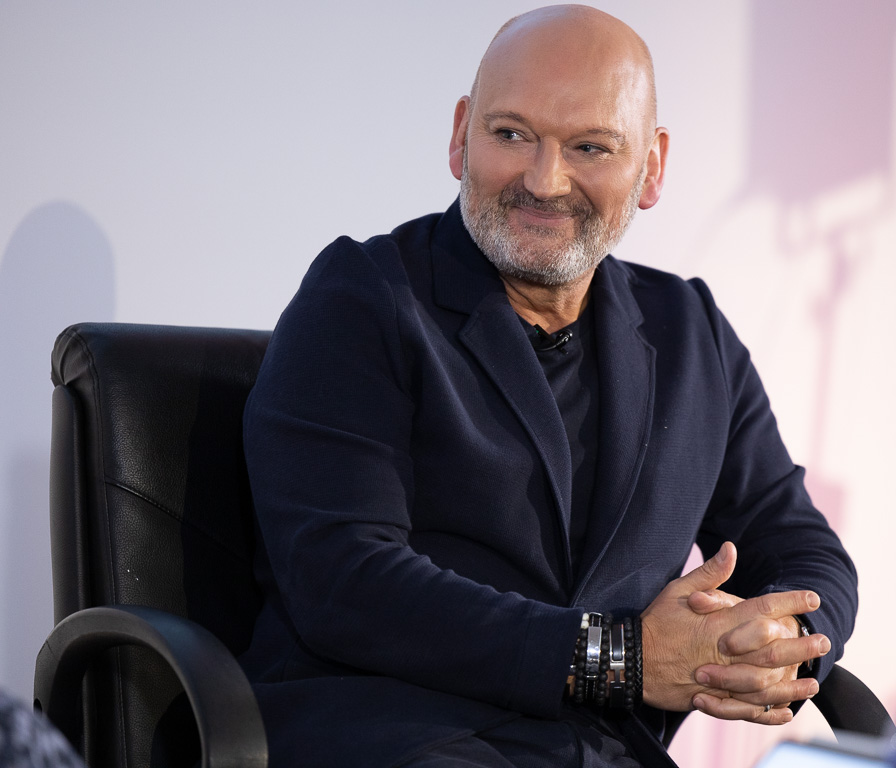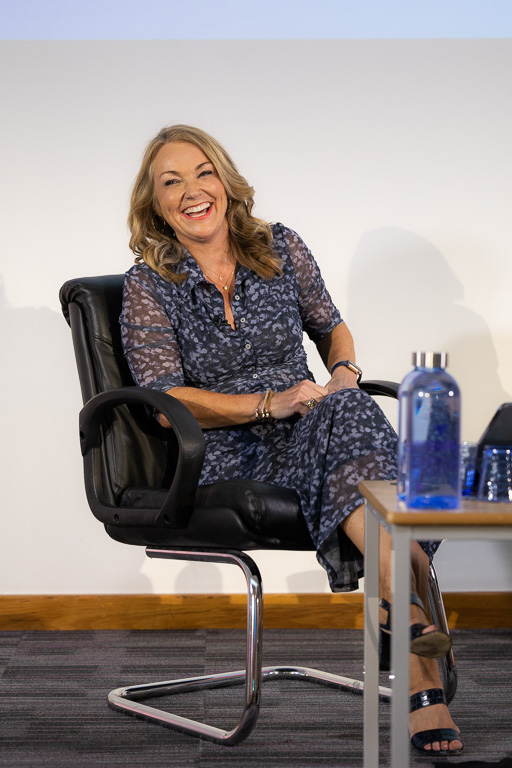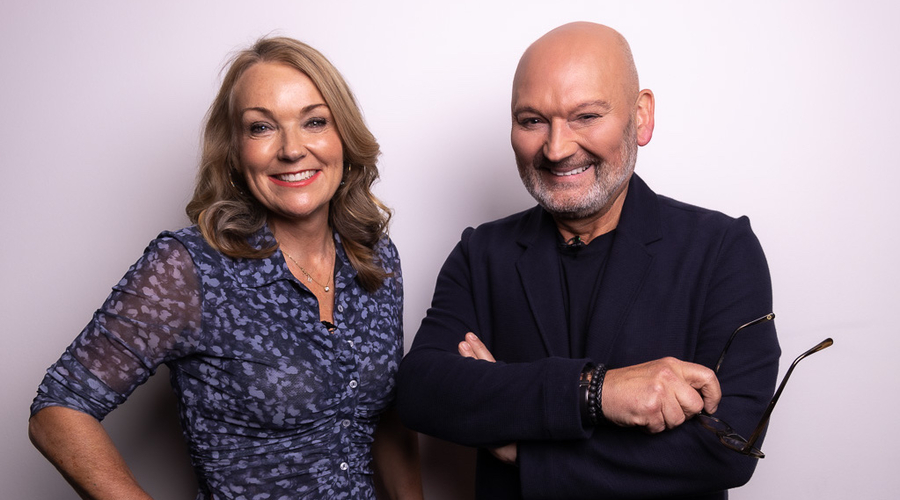Jay Hunt interviews Ben Frow in a lively RTS encounter that reveals why Channel 5 continues to defy gravity.
Ben Frow is nothing if not candid. During a high-energy RTS two-way with Jay Hunt, the architect of Channel 5’s revival gave an insight into how he’s turned around a broadcaster that last year enjoyed its strongest performance since 2009.
“Quite a few of you turned up thinking this would be the channel controllers’ version of Fight Club,” joked Hunt, one of British TV’s most successful content supremos, most notably at Channel 4 – she is now creative director, Europe, worldwide video at Apple.
She said the two were not mates but that she had been very impressed by Frow’s achievements.
He told her that when he first worked at Channel 5 as controller of features and entertainment, from 2004 to 2007, a lot of work needed doing. “There was a pungent smell about the channel for many years,” he said. “I was part of creating that smell and my vision was to get rid of it.”
He returned to Channel 5 in 2013 as director of programmes – he is now chief content officer, UK, Paramount, with a range of responsibilities that extend beyond the core channel. He immediately set about modernising an entity once associated with US imports, such as CSI, and the long-running Australian soap Neighbours, recently axed.
Today, Channel 5 is barely recognisable as the broadcaster it was nearly a decade earlier. Frow’s initial success was based on his uncanny knack for creating factual shows that punched above their weight – in a previous incarnation at Channel 4 his hits included Property Ladder and How Clean Is Your House? – and signing up big-name presenters such as Jeremy Paxman, Michael Portillo, Jane McDonald, Michael Palin and Jeremy Vine; Dan Walker made his debut reading 5 News this month, replacing Sian Williams.
More recently, despite his limited budget, Frow has guided Channel 5 through an impressive line-up of drama. “I’m not across the dramas. I don’t read the dramas,” he said. Successes have included a revival of All Creatures Great and Small and the Sally Lindsay-starring Cold Call. To date, under Frow’s leadership, the station has commissioned 60 hours of drama.
In an entertaining and often humorous session, Hunt teased out Frow’s approach to creating the widely admired broadcaster whose eclectic line-up embraces The Hotel Inspector, signature show Cruising with Jane McDonald, Dogs Behaving (Very) Badly, Happy Campers: The Caravan Park and children’s eco series Go Green with the Grimwades.
Dressed in trademark black (and sockless), Frow revealed to Hunt that quick decision-making and getting people such as McDonald, Portillo, and Palin (who recently visited Iraq for the broadcaster) had been key to transforming Channel 5.

How did he decide which ideas to greenlight? “You’re looking for something that will solve a problem, get you out of a hole. You can only take the risks if you bring in the viewers and if the advertisers are happy and the marketing department is happy,” he insisted. “You can’t play at television. It’s a creative job, it cannot be an indulgent job.”
He recalled that during the first lockdown he had felt incredible pressure and responsibility for the business and his team as the advertising market collapsed overnight.
But, ultimately, what he described as his “pragmatic approach” had left Channel 5 occupying a stronger place. Last year, the broadcaster raised its overall viewing share by 5% – and by a whopping 11% in primetime. For ABC1 viewers, Channel 5 enjoyed its best performance for 15 years, with 7% year-on-year growth for this demographic.
All this was achieved at a time of intense competition from the streamers and his public service rivals.
‘We are not a channel that is supposed to innovate and… break new ground. That is not my remit’
So, how did he know what would work, pressed Hunt. “I don’t know. Is it age? [Frow is 61 in July] I’m not trained in media so it’s not something I’ve learnt. I come from a theatre family – connecting with an audience…”
Frow remembered how, when he became director of programmes, he gave his commissioning team an ace card that they were allowed to use on a project that he didn’t want but which they believed in.
He explained: “I want them [the commissioners] to take me to a place and force me to watch something that I wouldn’t necessarily have agreed to. I want to give them the space to argue their case…
“I know I’m nearly always right. I’m rarely wrong. [But] I want them to prove me wrong… force me to reappraise a subject, a talent, or a genre differently.”
Apart from being challenged by his team, how does he keep his creative antenna sharp? “You read the papers, and everyone is talking about how much money they’re making from their property. That was how Property Ladder was born. The Yorkshire Vet just popped into my head. I liked the sound of that. It’s got a warm, cosy feeling.”
Of Cruising with Jane McDonald, he said: “It’s a very me show. I was crystal clear about what I wanted to do. I was walking the dog on Clapham Common. Oh, cruising. Jane McDonald [laughter].… We utilise Jane brilliantly. Interestingly, when the first cut came in it was a very different show – very sneery.” Frow ensured that it was re-edited to be warm and cosy.
He continued: “I’m not pretending that our job is to reinvent the wheel. We are not a channel that is supposed to innovate and create new directions and break new ground. That is not my remit. We are a commercial channel that has to make a lot of money. It would be remiss of me to be negligently experimental.
“I see something that works on another channel and think: what is our way of doing it? It could be walking programmes. I think: how are we going to do walking programmes that say something about us?
“It’s a very pragmatic approach to thinking about ideas. We look at what works, we look at what worked five, 10 years ago and what we could reinvent. Should we bring back entertainment shows? What would our take on property be?”
No less a figure than culture minister Nadine Dorries recently described Channel 5 as “the levelling-up broadcaster”, presumably referring to its non-metropolitan flavour, perhaps personified by Jane McDonald, and its popularity in the regions.
Hunt asked if Channel 5 had unintentionally become the levelling-up broadcaster? Frow replied: “We have a lot of regional voices. We film all over the country and don’t make any programmes in London. A lot of our presenters have regional accents.”
He added: “Nowadays, we’ve all got so much choice. The key point is to try and provide content where people go, ‘I really want to watch that because I enjoy being in that person’s company. Or I love being taken to that surprising place. Or I love the tension that this brings. Or I love the fact that I don’t have to think about what I am going to watch at 9:00pm because there’s a Channel 5 drama.’
“You cut through all the choices that we have and say: ‘This is a place we will give you what you want and make you feel good and pleased to have spent time with us.’ I try to apply that to every single programme.… If we fail, we fail, but we can only fail if we’ve done our very best to make sure the content is good.”
It may be that Frow’s unusual background for a British TV executive helps him to connect with parts of the UK that, say, the BBC can find it hard to relate to. “I am an outsider,” he said. “I was an outsider at my choir school ’cos I couldn’t really sing that well. At my comprehensive school, I was a gay boy who spoke posh, so I was an outsider there. As a costume-maker, I wasn’t as good as other people. In a way, being an outsider liberates you, it gives me the confidence to sit on these panels and fight my corner.”
‘We all know that young people are very hard to get… I could piss a lot of money away trying to chase them’
What is clear is that, under Frow, Channel 5 appears to ignore some of the things his PSB competitors obsess about. He couldn’t care less about his shows having a global audience – or, come to that, what the streamers are doing. Hit shows tend to start off as local hits, whether it’s Strictly or MasterChef.
He is not interested in chasing younger viewers. Hunt noted that he’d ended up with an audience that is more diverse in terms of regionality and is skewing older and often upmarket. That’s not a bad sweet spot for generating revenue.
Frow responded: “As you get older you stop listening to Radio 1 and start listening to Radio 4.… Look, there are a lot of other channels chasing the young. We all know that young people are very hard to get. They don’t watch television in a conventional way. I could piss a lot of money away trying to chase them.”
He needs no reminding that big, successful shows need to appeal to a wide range of viewers, comprising different demographics. Without naming names, he categorised some programmes on the BBC, ITV and Channel 4 as “lazy”, “second-rate” and “mediocre”.

Including his own channel in this harsh analysis, Frow said he sometimes looked across the schedules and thought, “Is this really the best we can be?” He added that “99 times out of 100, I can tell when they won’t work. Viewers aren’t stupid and they know when something is mediocre. We need to be brave and anarchic. If we are going to go down, it should be all guns blazing.”
Frow’s favourite Channel 5 meeting of the week is the regular 5:00pm Tuesday get-together, when all the schedules are published and he and his team forensically analyse them to look for opportunities to place their own shows.
“Channel 4 plays a drama against a BBC drama. Why are they doing that? It’s insane.… My job and [that of] the commissioners is to provide the scheduler with as much ammunition as possible, ammunition that can work for us in many different scenarios – male, female, broad, light, dark…
“My eye is mainly on the four other terrestrial channels. How can we grow our share year on year? I am not interested in week on week. I know that last year on this day we got a 4.7% share.”
This year, Channel 5 has so far enjoyed five months of continued growth. Not that he is resting on his laurels – especially with the World Cup coming up in November, he needs to get more in the bank in terms of audience share.
Regarding his decision to defy the sceptics and build a successful drama portfolio, he told the RTS that his approach was identical to his attitude to factual: “We didn’t have that much money, so we had to find people who wanted to be creative. A lot of people want to do drama but they’re not going to be given the opportunity because it is a bit of a closed shop and it’s snooty.
“We had to have drama because it is very popular. I was surprised at how quickly we ramped it up.… We now know what works.
“Like factual, the challenge is that we’ve got to have some stuff that is surprising. Crime does well, thrillers do well, but we’ve got to have the pieces that make people go, ‘Wow’, and take some risks with shows that are so not Channel 5.”
Report by Steve Clarke. ‘In conversation with Ben Frow’ was an RTS national event held at the Cavendish Conference Centre in central London on 7 June. The producers were Harriet Otoo and Clare Laycock.



